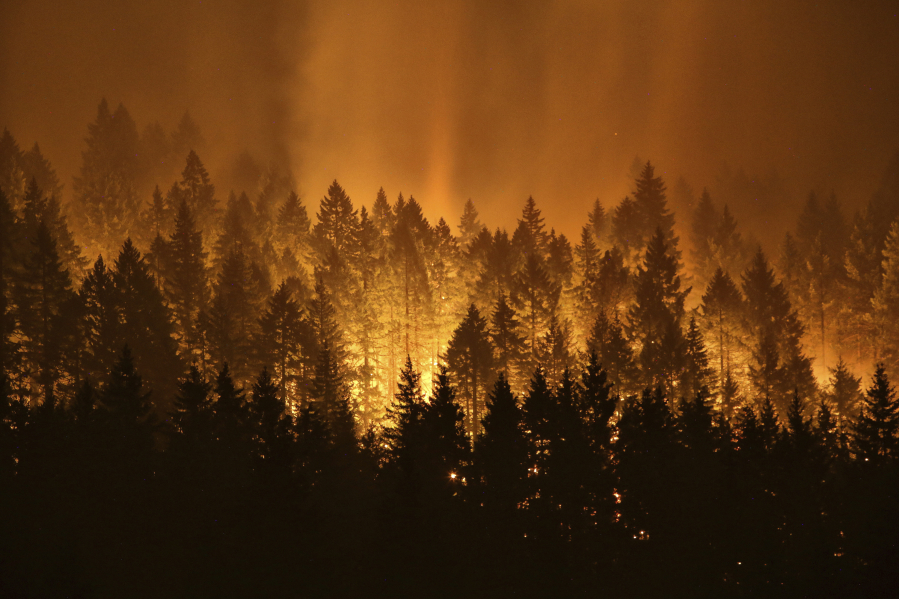Autumn rains have washed away the smoke of the summer wildfires. But Congress remains embroiled in a high-stakes environmental debate over how to reduce the growing threat of catastrophic blazes in Western forests and rangelands.
Lawmakers are under more pressure to act after a wildfire season that was particularly harrowing. Nearly 9 million acres — an area about the size of New Jersey and Connecticut combined — burned. Intense smoke hit many of the West’s major cities, including Denver, the San Francisco Bay Area and Portland.
The devastating California wine country fire, which killed 43 and destroyed nearly 9,000 homes and other buildings, competed for national attention with the hurricanes that hit Houston, Florida and Puerto Rico.
“What’s made it different this year is that it’s now clear that the fires are bigger and hotter and more powerful,” said Sen. Ron Wyden, D-Ore. He’s a central figure in the congressional fight over wildfire funding and forest policy.
Decades of suppressing fire has left Western forests choked with dense stands of smaller trees and brush. Combine that with hotter, drier weather driven by climate change and it’s produced a crisis as real as the flooding in Houston.
And here’s what’s making the problem worse: The U.S. Forest Service now spends more than half its budget fighting fires, up from just 16 percent in 1995. That means it is running out of money to work on fire prevention, particularly in the wildfire-prone communities where some 120 million Americans now live.
Wyden has fought for years to offload the cost of fighting big fires from the Forest Service onto the nation’s disaster agencies. That would put it more in line with how the U.S. handles hurricanes and earthquakes.
“The big fires ought to be treated for what they are, which are natural disasters,” Wyden said. “And you don’t raid the prevention fund to put them out.”
The Democratic senator’s so-called “wildfire funding fix” has gained wide support in Congress. But Republicans say it’s not enough. They insist Forest Service funding be tied to what they see as the real solution: A return to robust commercial logging on federal lands.
“I tell people I think we’ve loved our trees to death, and we’ve swung the pendulum way too far on trying to preserve timber instead of conserve timber,” said Rep. Bruce Westerman, R-Ark. “You know, preservation is what you do with art in a museum.”
Westerman, the only trained forester in Congress, is chief sponsor of the Resilient Federal Forests Act.
That measure, which passed the House on a 232-188 vote on Nov. 1, would override many of the environmental restrictions that dramatically shrunk federal timber harvests. Westerman says that more intensively managed forests are less likely to face catastrophic burns.
One of his chief allies is Rep. Greg Walden, R-Ore., who adds that more logging helps reduce fuel loads while boosting the Forest Service budget.
“When the country changed and said, ‘We’re not going to do that anymore. We’re not going to engage in active harvests,’ you lost that revenue stream that used to pay for those things,” Walden said. “I’d like to see us get back partially.”
Similar bills died in the Senate in past years as Democrats sided with environmental groups. This year, Republicans control both chambers and the White House. But they can’t overcome a Senate filibuster. Democrats say the crisis is too big to get hung up fighting over environmental laws.
“Why go to the timber wars of the past if we have the solutions sitting right in front of us,” said Sen. Jeff Merkley, D-Ore.
He noted that the Forest Service has a backlog of 1.6 million acres of thinning projects in Oregon that’s already cleared environmental reviews. The agency just keeps having to put off the work as it spends more money fighting fires.
Agriculture Secretary Sonny Perdue, whose agency oversees the Forest Service, has been an ally of Wyden in trying to get a permanent wildfire funding fix.
“I do think the momentum this year is greater than it has been in the past,” said Perdue, adding that forcing the Forest Service to borrow from prevention programs to pay for fighting fires is no way to run an agency.
There are also several attempts at a compromise. For example, Sen. Maria Cantwell, D-Wash., has authored a bill that includes provisions sought by both the timber industry and environmentalists.
“I think there’s a deal to be had here,” Walden said in an early November interview.
But since then, the Trump administration has come out with its latest disaster relief request, which does not include any wildfire provisions. Several lawmakers have looked at the next disaster-aid legislation as a possible vehicle for dealing with wildfire.



